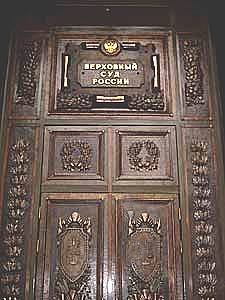The Russian Supreme Court postpones hearing on secret military decrees, which form the basis for Pasko conviction and allow the Federal Security Service to prosecute people on bogus spy charges.
Lawyers for Grigory Pasko were frustrated this Tuesday in their quest to free their client whose conviction is based on secret Defence Ministry decrees. The court hearing was postponed until May 7th due the fact that the highest authority within the Russian Supreme Court, the Presidium, considered similar issue on Wednesday last week and its decision will be made ready only next Monday.
At issue are two Defence Ministry decrees — nos. 055 and 010 that have been on the books since August 10th 1996 and August 7th 1990 respectively.
The Supreme Court, after having nullified decree No. 055 this fall, last Wednesday overturned the earlier ruling that invalidated part of a secret Defence Ministry document used to prosecute high-profile espionage suspects such as environmentalist Aleksandr Nikitin, military journalist Grigory Pasko and arms analyst Igor Sutyagin.
The 11-member Presidium of the court last week said the court should give another look at decree No. 055, which gives a list of data that the Defence Ministry considers to be state secrets.
In a separate ruling in February this year the Military Collegium of the Supreme Court nullified the whole decree No. 055 and decree No. 010, but refused to make the decision retroactive.
The Soviet era decree No. 010 forbids servicemen and all other people with access to state secrets from having contacts with foreigners if it is not a part of their service responsibilities.
At this Tuesdays three-judge hearing, Paskos Lawyer Ivan Pavlov was seeking to make the courts ruling from February this year on the Defence Ministry decrees retroactive from the date of decision. That would have legally freed his client and made hash of any of the treason charges that were previously levied against Nikitin — who was acquitted in 1999 — and Sutyagin Both were accused of their espionage activities in the late 1990s.
Nikitin, whose appeal led to the original September ruling, said that what he and his supporters are demanding is a clear legal playing field.
“As an ecologist exploring nuclear issues, at any moment I can once again run into a fact that this decree considers a state secret,” said Nikitin, who now heads the St Petersburg-based Bellona office in Russia.
Russia has a federal law on state secrets, but its categories of classified information are very general and it allows ministries and other federal agencies to draw up their own lists of secret data.
In annulling the 10 articles that fall under the rubric of Decree No. 055 in September, the court said the decree was not issued solely for the Defence Ministry’s internal use and thus should have been registered with the Justice Ministry and made public.
But the ministry’s representative, Lieutenant Colonel Konstantin Rusanov, said in a telephone interview — as he sad to the presidium in September — that decree 055 was a mistake.
“This decree is just a list of information, it is not a law and it is dedicated for internal use,” he said.
But Rusanov conceded that the decree should not have been used by prosecutors from a different agency — for instance, the Federal Security Service, which filed charges against Nikitin, Pasko and Sutyagin — or against civilians.
He warned that if the court, after its review, upholds the September ruling, then the Defence Ministry would issue a new decree that would be equally strong. If the court continues to consider such decrees to apply to other agencies, the ministry would register the new decree and then it could indeed be used to prosecute civilians as well as members of the military, Rusanov said.




